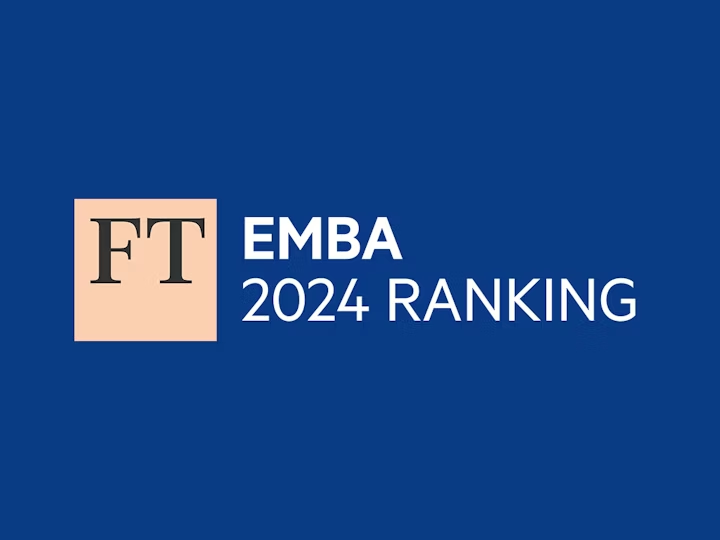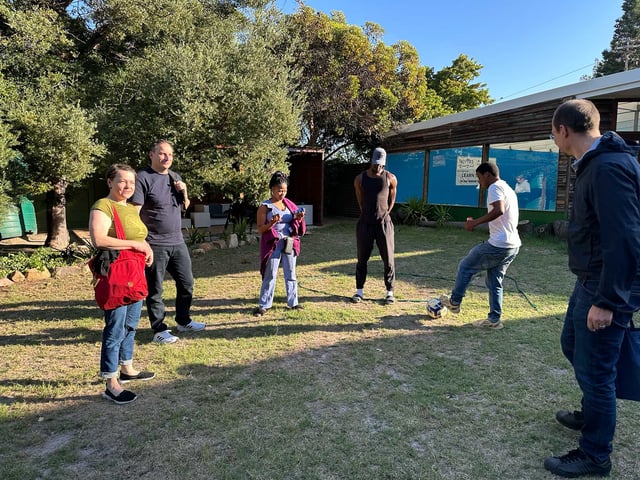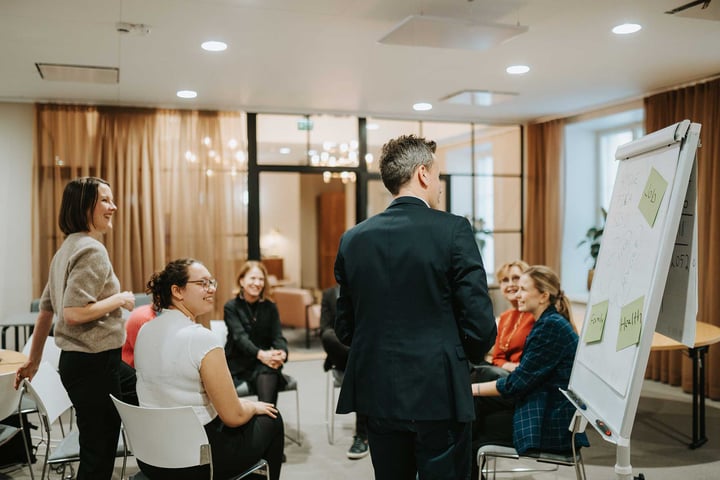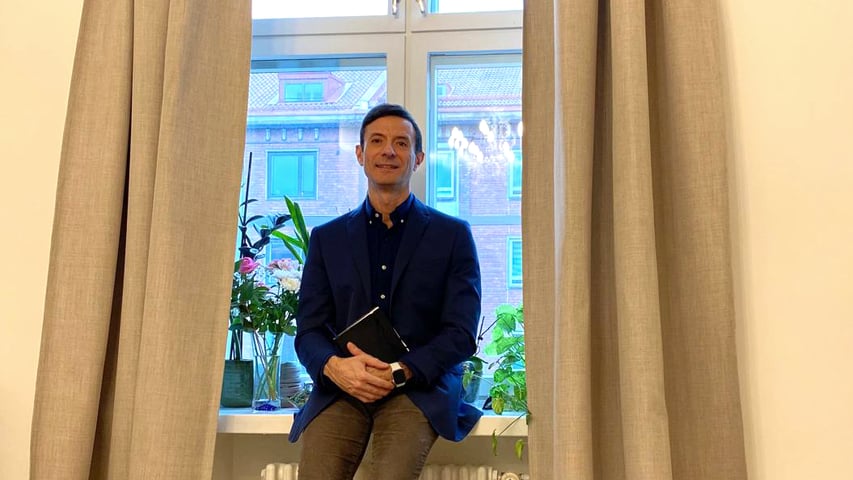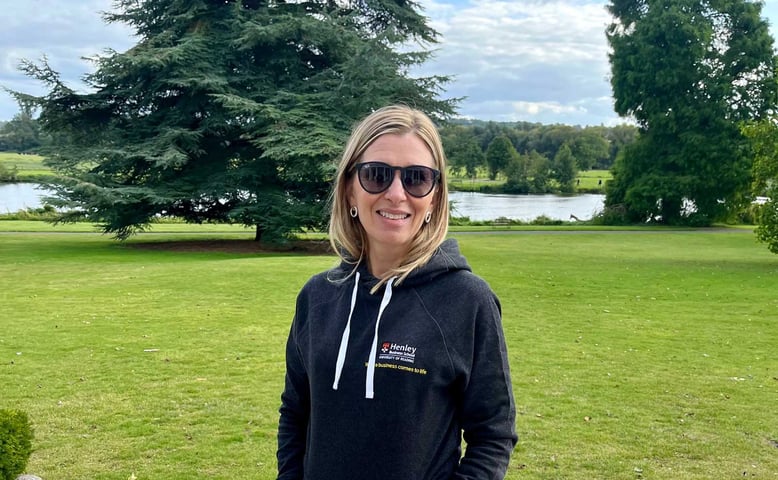Caroline Bixby didn’t do Henley’s Global EMBA to prove herself. She did it to grow as a neurodivergent leader. And it delivered.
Graduating is always a proud moment. But when Caroline Bixby crosses the stage in a few months with her Global EMBA from Henley Business School, it will be a particularly personal triumph – having believed for most of her life that she lacked the ability to study, let alone at this level.
I’d always been told that I was not academic, that I didn’t have what it took to be successful at university – and I believed that.
She knew she was different, sure. It had always been hard for her to fit in and meet the expectations of others. But she was desperate to shine and be good at what she did – ‘who isn’t?’ she speaks. So, Caroline worked twice as hard to get ahead and get ahead she did. Rising rapidly through the ranks of HR to director level.
But a lack of confidence continued to gnaw away at her self-esteem playing havoc in ways that she didn’t realise at the time.
My CV reflects this. A typical role for me lasted just over two years. During the first six months, I’d excel, but the amount of focus and time I had to devote to make this happen meant that I became burnt out and made mistakes along the way.
All this changed when she got an official diagnosis of Attention Deficit Hyperactivity Disorder (ADHD) in her early 50s. Suddenly, it all made sense: the “scatter-gun decision making”, her ability to see patterns in complex data where others couldn’t, her cool headedness in a crisis, the energy she brings to a room.
These, she realised, were her unique strengths, and the areas where she was less strong could easily be managed. ‘ADHD is just part of who I am,’ Caroline says.
Opening the doors to learning
This new insight into how her brain works catalysed a series of events, which has seen her complete the Global EMBA, become a qualified coach and get promoted into her current role as Chief People Officer at Christie Group plc. And it all started when she spied an advert to win a scholarship to the Global EMBA at Henley Business School.
I entered this competition on a whim, and although I didn’t win, I was shortlisted. This gave me the confidence I needed to apply for the programme. I was at a stage in my career where I didn’t feel like I needed an EMBA to prove myself; I just really wanted to do it for myself,
she speaks. ‘And for the doors to learning that I hoped it might open.’
The degree has delivered that and so much more, Caroline says. In fact, the passion for learning and research that she’s uncovered in herself has taken her by surprise.
‘I loved the research element of the EMBA – I’ve had to rein myself in,’ she jokes. ‘I really enjoyed writing the assignments; it’s a bit weird, I know.’
The ability to delve deep, to explore the intricate threads of complex topics, resonated with her deeply. This wasn’t the rote learning she’d feared; it was an intellectual exploration that fed her curiosity.
Fast forward two years, I am in the process of completing my dissertation on a subject I am passionate about, with an amazing support network around me.
A global perspective
The global nature of the programme has also proved invaluable in filling out her understanding of doing business in a global world, she adds. Working as she does in a multinational with six different companies across multiple countries, understanding how to navigate cultural differences is a large part of what she needs to do to be effective.
‘It’s that whole bit of accepting and understanding differences that is so valuable, isn’t it?’ she says.
As part of the EMBA, she travelled to Miami, Cape Town and Copenhagen, in addition to the time spent on the Greenlands campus in the UK, with each stop revealing new and powerful insights and a felt experience of learning that is hard to rival.
This is not something you can get from a lecture or a book. It gives you a different perspective and teaches you a bit about yourself and how you do things too, especially as you have to relate your assignments back to your own work.
One assignment, for example, was a comparative analysis of HR management in France and the UK, a task that demanded a nuanced understanding of cultural differences. ‘It made me take a step back and interrogate the message I’m communicating and how I’m presenting it. And I started to see the thread that could help me work across these contexts.’
The ADHD advantage: reframing strengths
For Caroline, the EMBA also fostered a world of collaboration, a stark contrast to the isolation she sometimes felt in her early career. ‘The EMBA is not a lonely process,’ she says. ‘You’re in a group. You are not on your own.’
Having a group of peers, all at an advanced stage of their career, with whom you can talk things through is pretty mind-blowing and humbling at the same time, she adds. ‘Honestly, the collective experience in the class is what makes the experience truly transformative. You couldn’t pay to get that kind of experience in one room at any seminar you might attend. And these highly intelligent people are your friends and colleagues. It’s just unbelievable.’
What she realised by being part of this high-powered learning group has been quite profound. As a neurodivergent leader in the C-suite, she brings a unique perspective and valuable talents that others can only dream of. And on the flip side, she doesn’t have to have all the answers herself. ‘For the areas that I’m really rubbish at, others can fill in,’ she says. ‘We’re not all experts at the same thing, after all. When you think of it, it would be pretty bland if we were!’
This is now translating back into how she leads. More than ever, her focus is on bringing people along on the journey with the company, giving them more agency and enabling them to do the things that they need to do to be effective.
‘In our business, we help clients buy and sell businesses across the UK and all of Europe, and it really is all about relationships, trust and credibility,’ she says. ‘This starts with creating an inclusive workplace where each person is recognised and valued for who they truly are.’
The alternative, expecting people just to fit in, does not lead to a happy outcome, she says. ‘Masking as a neurodivergent person is the most significant drain of energy and attention I have ever experienced,’ she says.
With the sense of overwhelm so prevalent in many workplaces today, an emphasis on inclusivity can make all the difference between success and failure, she believes.
It is only when we know who we truly are within a diverse group of colleagues who value each other’s differences that we can truly make our fullest contribution to the world.
The quick Q&A
- What would you say to someone considering a Global EMBA at Henley?
Do it. If you want to be more, whether in your job or just in who you are. It doesn’t matter your age – if you want to learn and you want to learn from others, then do it, even if, like me, you are a bit short on confidence upfront and might not have the necessary qualifications. - What advice would you give your 21-year-old self?
Believe in yourself. It might be scary. But on the whole, if it’s scary, it’s good. Also, don’t feel like you need to rush to make a decision. Take a breath, sleep on it and then go for it! - How important are networks, and do they still matter in today’s workplace?
My whole career has been built on my networks, and networks are such an important bit of any career, now more than ever. And I don't mean networks where you're using people; that's not it. It's about connections, collective understanding, being able to do things differently, and curating insights that allow you to get more things done than you could on your own. It’s also, of course, about what you can bring and add to this ‘hive mind’ that counts. - Any tips for those embarking on the Global MBA journey?
Don’t be shy to seek out the support of lecturers and supervisors and your peers. When I asked for support and help, it’s been given freely and without judgement. I must admit I wasn’t expecting that level of support. But the people running this programme really care about your success. So just ask for help if you need it – don’t wait!
The next EMBA Global international group begins their 2-year journey in October 2025. Read more from the programme page »
